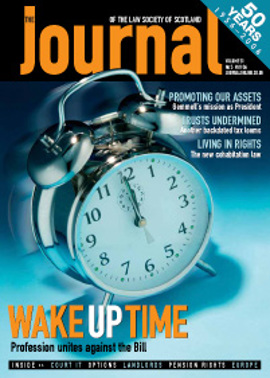The foreign legion

“There certainly seem to be quite a few Scots working at the European Court of Justice at the moment”. The comment was made in passing by a colleague not long after our arrival at the ECJ in October 2003. We didn’t think much of it at the time. However when the subject of Scots working in the European institutions came up in conversation recently we ended up wondering to what extent this situation could be put down to pure coincidence, or whether it reflects a growing trend of younger Scots lawyers keen to gain invaluable professional experience furth of Scotland?
ERASMUS and beyond
Whatever the answer, the conclusion we reached is that times are unquestionably changing. Not only are today’s law graduates conscious of the fact that qualifying as a solicitor in Scotland can open the door to a rewarding career in this jurisdiction, but they (or rather, we) also realise that that same qualification can equally provide a stepping stone to a host of exciting and challenging opportunities beyond the Scottish horizon. From studying abroad as part of the ERASMUS programme to getting some work experience in a European institution, from furthering studies of Community law in Bruges or Florence to working in a foreign office of a UK-based law firm, the opportunities open to those of us attracted by the idea of studying or working in legal systems, and often even in languages, other than our own are plentiful. But what do such experiences involve, and what, more importantly, is to be gained from them?
Without a doubt, the ERASMUS programme – the European Community programme which encourages student exchanges between European universities, allowing students to study law abroad as a part of their LLB – has a large part to play in broadening the horizons of today’s young lawyers. The success of this programme means that more trainees and solicitors entering the profession than ever before have some experience of living and studying law in another European country. We both undertook an ERASMUS year as part of our degree. This experience, in Brussels and Rouen respectively, proved to be an invaluable first introduction to the (up to that point, somewhat mysterious) civil law legal system and, it turned out, fostered a strong interest in European, comparative and international law.
Still time after you graduate
Of course, even for most younger readers graduation day is already a distant memory and ERASMUS no longer an option. However the “Eurodevils” scheme operates along the same principles but for lawyers who have already entered the work environment. Alternatively, a one year masters degree in European law (preferably somewhere sunnier than home) can serve not only as an interesting addition to a CV but as a stepping stone to the many and varied career opportunities for specialists in the field.
In short, as well providing an insight as to what goes on in an “auberge espagnole”, an ERASMUS year or similar period of academic study abroad is undoubtedly an experience that broadens the legal mind and encourages the discovery of other jurisdictions.
While the European Union continues to evolve – not least through the enlargement two years ago from 15 member states to 25 – and Community law naturally continues to filter through to the laws of each of the member states, the European institutions responsible for the conception, drafting and finalisation of EU legislation and policy have, as a result, an ever more important role to play in the lives of each and every one of us, both personally and professionally. The corollary to this is that working within these bodies has never been more interesting.
What the EU can offer
Many of the institutions offer what are called stages, namely set periods of a few months which allow the stagiaire to get a taster of what the work in the institution involves and an insight into how it fits into the greater institutional scheme. The European Commission, for example, organises two five-month stage periods per year, which allows a number of young lawyers to work within its many departments, such as the Legal Service or Competition Directorate-General. An excellent alternative is to undertake a stage at the European Court of Justice in Luxembourg. Many of the judges and advocates general of the court allow young lawyers to spend a period of time in their chambers, which, for anyone with an interest in litigation, is a truly fascinating experience.
Such a short-term experience may even provide the starting-block for a long-term career; you may decide to enter the European Civil Service (and, therefore, be eligible for a permanent post in any of the EU institutions) by passing an open entrance competition, or you may decide to seek a position at the court as a legal secretary (référendaire) in the chambers of a judge or advocate general, where your task will be to assist the judge in the preparation of cases and the drafting of judgments. Opportunities can also arise for lawyers in the Research and Documentation Service and, for those interested in combining law with their language skills, in the English translation division of the court. Alternatively, it may simply provide a rich professional experience to take back home…
Opportunities in practice
Of course, although working in the institutions provides a unique opportunity to really be a part of the European process, it is not the only option for those of us seeking a path abroad. As the profession consolidates and law firms look to a global model, a secondment to a European office of a UK law firm can constitute an interesting “time out” without stepping off the private practice career track. Indeed, especially in Brussels, and increasingly in other European cities, while the names of the law firms are familiar, the work and the environment are refreshingly new and challenging. Most of the multinational firms offer secondment from trainee level upwards. However, even if your firm does not operate as part of an international network, there is nothing to stop you simply looking for a job opportunity abroad. Quite fittingly, the city which is recognised as being at the heart of European law is one place where the legal community really does have an international profile; indeed Brussels is one of the few places where your professional qualification will be recognised without any further ado and you will be entitled to register on what is known as the “European list” at the Brussels bar.
Whichever of these routes is embarked upon, there is little doubt that professional life in an international environment provides an unparalleled experience which challenges in many ways. For example, with respect to the options outlined above, it is fair to say that while not always a necessity, a second language is most certainly an asset (for example, although the common business language in most international law firms is English, the working language of the ECJ is French). On a personal level, it provides an opportunity to meet and get to know people from a wide variety of cultures and backgrounds. From a legal perspective, it encourages valuable introspection, often requiring you to look at your own legal system, compare it with others and learn its strengths and its weaknesses, its flexibility and its limits. Our experience at the ECJ, often as part of a minority common law voice in a principally civil law orientated environment, has certainly allowed us to look at Scots law through a refreshingly different looking glass.
While some may argue, as Alistair Bonnington did in the September 2005 issue of The Journal, that the Scottish legal system still has much to learn from other jurisdictions, it should also be conceded that today’s young Scots lawyers are venturing further than ever before and doing just that. Today, being a Scots lawyer should not be seen as an end in itself – it is very much a means to a wealth of various ends in Europe and beyond.
Since qualifying in Scotland, Fiona Young has worked as a Scots lawyer in the Research and Documentation Service of the ECJ; Lorna Young has worked as a référendaire to the Finnish member of the Court of Justice, Judge Rosas.
USEFUL LINKS
LLM at College of Europe, Bruges: www.collegeofeurope.be
LLM at European University Institute, Florence: www.iue.it
DES at Université Libre de Bruxelles: www.ulb.be//catalogue/iee/DESEUROJM.html
European Commission Stage Programme: www.europa.eu.int/comm/stages/index_en.htm
European Personnel Selection Office (where open competitions are published): www.europa.eu.int/epso/index_en.htm
European Court of Justice: www.curia.eu.int/en/instit/presentationfr/index_emplois_stag.htm
In this issue
- Stand up to be counted
- A bill to divide us
- The pendulum swings
- The pendulum swings (1)
- Cohabitation: the new legal landscape
- The tax man cometh (again)
- The foreign legion
- Making IT happen
- Apportioning and sharing
- Property problems
- Still a profession
- Arguing over agreements
- Next generation law
- Lawyers in the transfer market
- Scottish Solicitors' Discipline Tribunal
- Landlords: setting the mark
- Website review
- Book reviews
- Purchase options in leases






